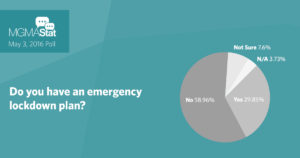ENGLEWOOD, Colo. – Since its founding in 1926, Medical Group Management Association (MGMA) has relied on annual surveys to collect the industry-leading data on clinical practice administration for which it is known. But with the recent launch of MGMA Stat, a text-message-based polling system, the 90-year-old organization for healthcare executives and administrators has developed a new, more immediate way to gather useful information from its 33,000 members.
“MGMA is well-known within the healthcare industry as a leader in compensation and cost data,” said Kristina Ziehler, assistant director of data solutions at MGMA. “MGMA Stat is intended to complement that data with real-time information on how healthcare professionals are handling gun violence as a public health issue, dealing with the Zika virus, or transitioning to value-based care.”
According to Ziehler, using MGMA Stat is simple. After enrolling in the free service by texting the word “mgmastat” to 33550, participants will receive one to two polling questions per week. Each question will include a short list of possible answers, from which participants can select their responses. The entire process – from receiving a question to sending a reply – generally takes less than 10 seconds.
“We text the questions to our users on Tuesday morning,” Ziehler explained. “They have 24 hours to respond. On Wednesday, we analyze the responses they sent, aggregating and organizing them. Then we deliver the final results of the poll to our users on Thursday morning.”
Within 48 hours, participants in an MGMA Stat poll will receive insight into how executives and administrators around the country are confronting pressing issues like physician burnout, nursing strikes, and staff shortages. According to Ziehler, MGMA Stat enables its users to take part in a national conversation on the topics and trends currently affecting medical practices everywhere.
“In May, we asked our users, ‘Do you have an emergency lockdown plan?” Ziehler said. “It was a question that people within the MGMA community were already asking. Then we sent a follow-up question to the 30% of respondents who answered yes, asking them what their lockdown plan looked like.”
By offering a glimpse into how healthcare executives and administrators are currently managing their practices, MGMA Stat makes it easy for Ziehler and her team to identify users who might benefit from further information on specific issues. During one poll, respondents who stated that they were not educating patients about the Zika outbreak received a link to easy-to-understand materials describing the dangers of the virus. During another, they were sent information about Meaningful Use.
In recognition of the advantages provided by the service, MGMA is planning to make MGMA Stat available to any healthcare organization that wants to use it.
“For the past few months we’ve been talking with other organizations about potential partnerships,” said Ziehler. “Whether they’re large, medium, or small, they’re all excited about using MGMA Stat, because they know it will allow them to ask questions that will help them improve their practices.”
While MGMA Stat currently has several thousand respondents, Ziehler is intent on expanding its user base into the tens of thousands. In an effort to attract new participants, the service will be showcased at MGMA’s 2016 Annual Conference, where attendees will be able to receive and respond to polling questions.
“Our long-term goal is to become the leader in real-time healthcare data,” said Ziehler. “We’re striving to make MGMA Stat a best-in-class service, and we’re excited to have conversations with any organization interested in joining us, because ultimately this is about using data to improve how care is delivered.”
Like the coverage that CyberMed News provides? Follow us on Twitter, LinkedIn, and Facebook to make sure you keep up to date on the most recent developments in digital health.






Be the first to comment on "Generating Real-Time Healthcare Data From Text Messages"